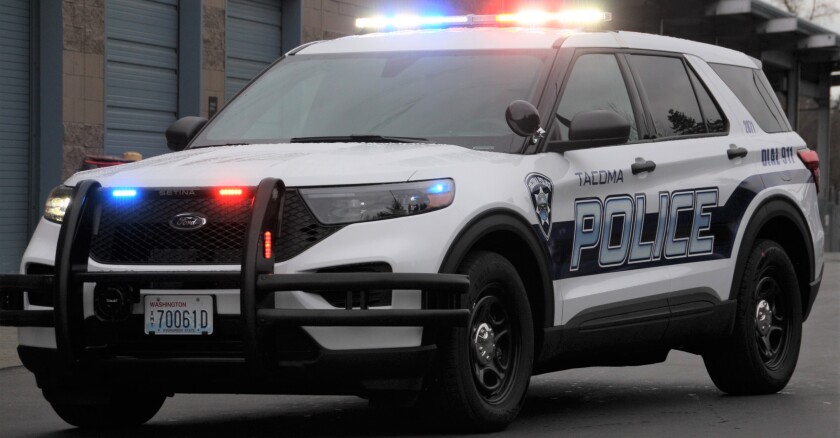In Tacoma, Wash., the police department plans to introduce electric-hybrid police cars into its fleet, signaling a move toward reducing greenhouse gases, fuel costs and expanding the application vehicles among city fleets.
Other cities like Los Angeles, Denver and Boston have already begun the move toward transitioning city vehicles like fire trucks, buses, light-duty vehicles and others toward electric power. However, the heavy operational demands of police vehicles, which pose their own recharging challenges, have mostly left police uses out of the transition to fully electric vehicles.
Tacoma has purchased 34 Ford Police Interceptor hybrids — an SUV-type vehicle — with an anticipated fuel savings of 40 percent, said Paul Hanna, division assistant manager with the Tacoma Public Works Fleet Services. The savings will reduce fuel consumption by more than 28,800 gallons of fuel per year, and save the city an estimated $73,700.
The city currently operates 13 fully electric vehicles, and 92 hybrid-electric vehicles, he added.
A complete transition to hybrid-electric police vehicles has been delayed due to budget constraints brought on by the COVID-19 crisis, Hanna said. Tacoma originally planned to purchase 59 hybrid Police Interceptors, but budget reductions trimmed the order to 34 vehicles.
And a move to transition all of the police and other vehicles to fully electric models is limited by a lack of charging infrastructure, cost and a “lack of viable options for police patrol vehicles that are pursuit rated,” said Hanna in an email.
Planning out the recharging needs is generally one of the first strategic moves city fleets should take before buying electric cars, said Ian Snow, a transportation energy adviser with the city and county of Denver.
“We’ve found that it’s more challenging and more expensive to do the infrastructure side,” Snow said during a webinar last month hosted by Forth, an electric vehicle advocacy and education group, to discuss city fleet and personal vehicle electrification.
“What we’re recommending to many cities that are just getting into this is, start planning the infrastructure at least a year ahead of time of buying the vehicle. So that when you get the vehicle, it’s not just sitting out there,” he explained.
Denver operates roughly 3,200 city vehicles, and aims to have 200 of those operating as electric by the end of the year. A new policy also says electric-eligible vehicles within the city fleet will be considered for replacement. Eligibility is based on availability, duty-cycle and total cost of ownership.
“We want to keep that within 10 percent of the alternative priced vehicle,” said Snow. “We don’t want to be over-spending on these EVs just because we can.”
Fleet managers in Boston say the city aims to have a 100 percent electric fleet by 2030.
“While environmental concerns are one reason for this, we also see EVs as a cost-savings opportunity once we achieve this goal,” said Matthew Bradley, Boston superintendent of automotive maintenance.
A survey of fleet managers by the technology firm Samsara reports 90 percent saying “EVs were the inevitable future of commercial fleets.”
Fuel efficiency and reduced maintenance costs tied as the top reasons fleet managers offered for considering EVs.









